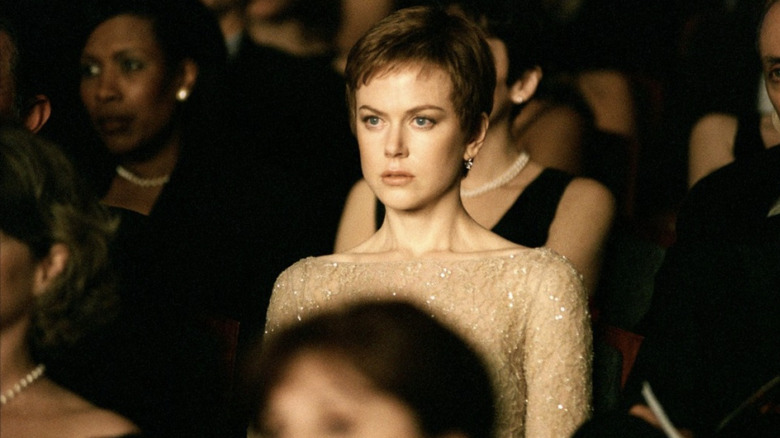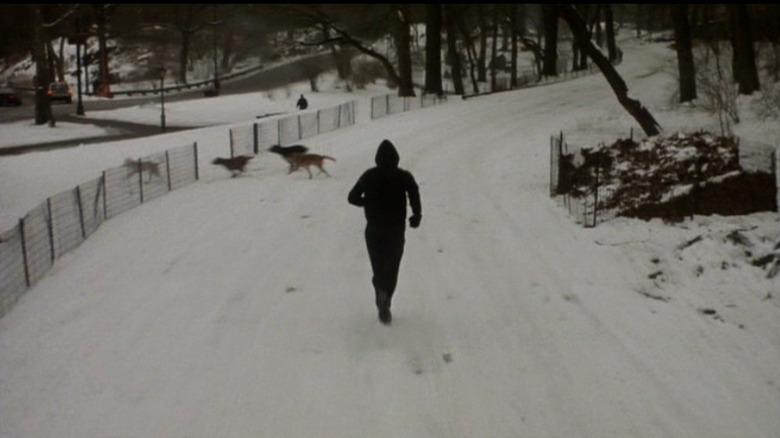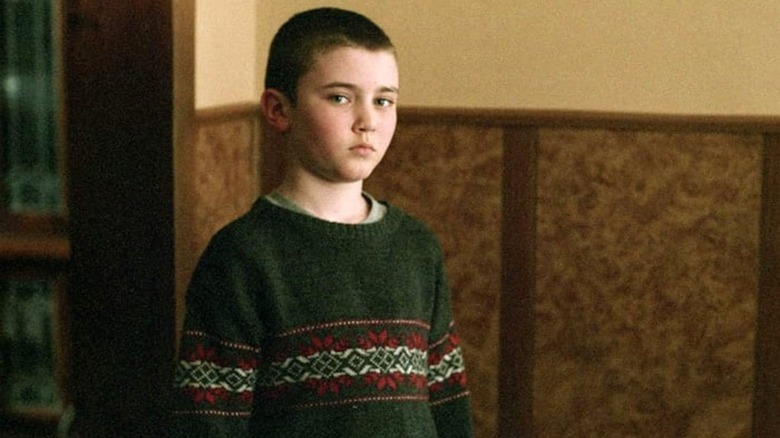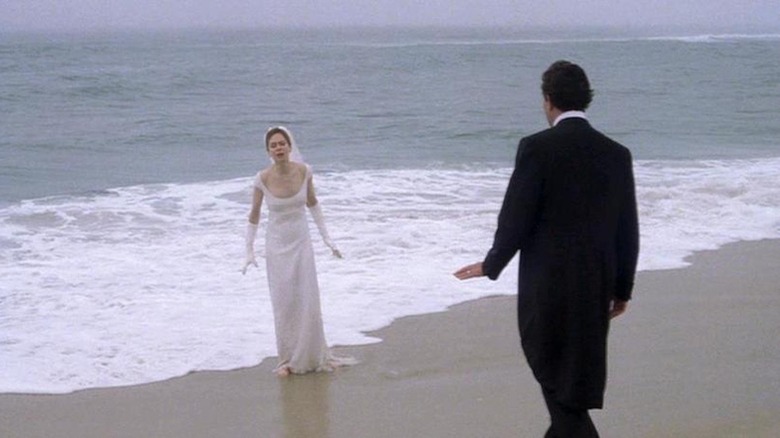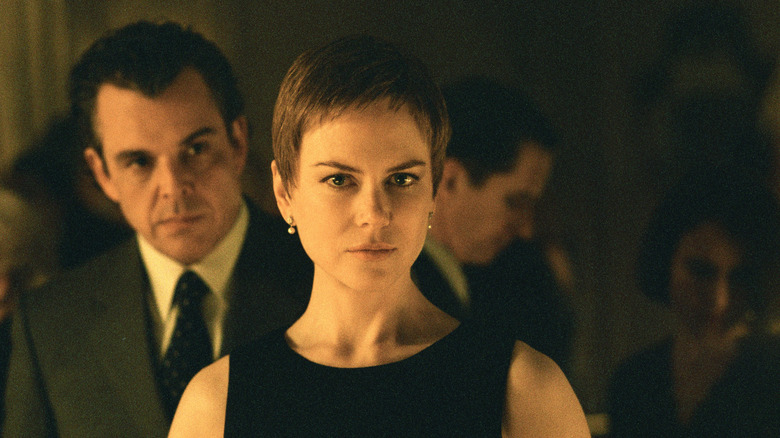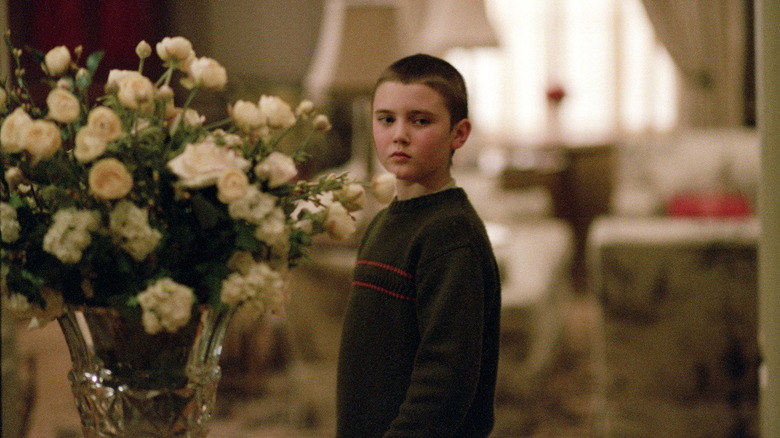Birth Ending Explained: Love, Everlasting ... Or Is It?
Jonathan Glazer's "Birth" is one of the most beautifully baffling movies of the 21st century. It begins with a seemingly supernatural premise — a 10-year-old boy shows up out of the blue claiming to be the reincarnation of a soon-to-be-remarried woman's deceased husband — and builds to a climax that, depending on who you ask, is either thrillingly wide open to interpretation or catastrophically nonsensical.
Glazer spends the bulk of the film inviting us to believe that young Sean (Cameron Bright) really is the cosmically reincorporated version of an erstwhile Sean who was the love of Nicole Kidman's Anna's life. Most available evidence supports Sean's claim until Anna's best friend, Clara (Anne Heche), privately calls his bluff. She knows the kid is a fraud because Sean was in love with her, and, prior to his death, gifted her a trove of Anna's unopened love letters as proof. If the new Sean was truly dead Sean, he would've come to Clara first.
This devastates the child, who ceases his pursuit of Anna much to her distress. Ultimately, she reconciles with Joseph (Danny Huston), the man she jilted, and marries him. But she cannot shake the spell young Sean cast over her. Glazer ends the film on an emotionally devastating note, leaving us with questions as to how the child preternaturally ensorcelled a grieving adult. There are no easy answers here. There are only differing interpretations. Which one you choose to believe depends on how you approach the material.
What happens in Birth?
Glazer's film opens in darkness. We hear adult Sean finishing a lecture on reincarnation, which, as "a man of science," he brushes off as "mumbo jumbo." (This is a racist term, by the way.) Glazer then transitions to Sean jogging through a snowy Central Park. Harris Savides' camera glides behind Sean as if on wings, with Alexandre Desplat's haunting score completing the ethereal scene. The first cut is a fatal one. From a head-on angle, we see an enshrouded Sean collapse and die. The next shot is of an infant being extracted from a pool of water.
I linger on these details because, literally and metaphorically, they form the narrative foundation of the film. When a decade later, 10-year-old Sean quietly crashes the birthday of Anna's mother (Lauren Bacall) and takes Anna aside to inform her that she mustn't marry Joseph because he is Sean, Glazer's visual language and heightened aesthetic have made an open-and-shut case. As young Sean inexplicably recalls intimate moments he shared with Anna and her family, we're left wondering what it will take for these people to realize they are in the presence of a metaphysical miracle.
Anna, who mourned Sean for 10 years before agreeing to marry Joseph, initially tries to break the child's spell, but the more time she spends with him, the more she becomes convinced he's truly Sean. Her family and close friends can't account for the boy's impossible knowledge of their private lives, but they understandably advise against pursuing a highly illegal romance with a 10-year-old.
Glazer developed his original screenplay with former Luis Buñel collaborator and inveterate provocateur Jean-Claude Carrière. This duo, along with co-writer Milo Addica, nearly crosses the line with Sean's seduction of Anna (particularly via the bathtub scene). But if this is actually Sean, how else would you expect him to behave? He is seducing her anew.
Anna's sold, but she's unaware her dead husband did not love her.
What happened at the end of Birth?
What happened at the beginning of "Birth" is vital to undermining young Sean's apparent ruse. Upon arriving at Anna and Joseph's engagement party, a distraught Clara breaks away from her husband Clifford (Peter Stormare), who was Sean's best man, and buries her gift in Central Park. Young Sean follows her, and we later learn unearthed the box, which contains unopened love letters to Sean from Anna. Presumably (but not plausibly given his age), he read these missives, and, floored by their ardor, fell in love with Anna.
Jolted from his precocious reverie, Sean comes clean (while caked in dirt that, oddly, won't wash off in the bathtub), thus breaking Anna, who was prepared to raise him as her child and marry him on his 21st birthday. Ick, right?
Anna reconciles with the humiliated Joseph, and, in the film's denouement, marries him at a beachside mansion. All seems well until we hear young Sean's final letter to Anna. He is now undergoing therapy and seems back to being a regular kid. But his words are still wise beyond his years. His mother thinks he was under a "spell" (we keep coming back to that word), and when he smiles for his grade school photo, we conclude that this spell has been partially broken. But his closing sentence is a haymaker.
"See you in another life."
The final, extended shot of the film (Glazer loves his oners) finds Anna staggering into the surf of the ocean. Joseph rushes to her. She wants to commit herself to the sea but defeatedly wanders back into her new husband's arms. And so we cut back to the blackness that opened the movie, only instead of a scholarly lecture, we get an incongruously peppy rendition of the pop standard "Tonight You Belong to Me."
What the end of Birth means
Taken on a literal level, the final third of "Birth" is ludicrous. We're to believe a 10-year-old kid rifled through a boxful of mash notes and absorbed not only the extended history of a love affair but also gleaned random family intimacies (enough to convince Arliss Howard's brother-in-law that he's on the level). This twist derailed the film for many critics in 2004, and it's the reason why, 19 years later, we're treating Glazer's sophomore feature as a cult movie.
This is not, however, a film meant to be taken at face value. Glazer withholds so much. We don't know anything about Sean prior to seeing him bouncing a handball in the lobby of Anna's ritzy apartment building — though an early scene where a friend clamors for an entranced Sean to come out of his bedroom and play suggests a sudden transformation. What we can't know is the quality of his distraction. Did the letters knock him sideways, or is this a possession?
Some critics have compared "Birth" to the spiritually conflicted films of Krzysztof Kieślowski. I think this is a perfect starting point, and I would guide you directly to "The Double Life of Veronique." We're not viewing life as we know it, but, rather, a curveball-hurling universe we cannot grasp. Young Sean is an unexplainable phenomenon, but the particulars of his condition are relatable. Everyone has fallen madly in love, and it's possible the object of their desire didn't reciprocate. Per Ms. Janet Jackson, "That's the way love goes."
"Birth" is exciting because neither main character knows why they're fated to never be with each other. I don't believe young Sean did a deep-tissue analysis of Anna's letters. He felt her swoon and fell in love with a woman who loved a man who did not exist. This brings us to the other reading of the ending.
Another possible explanation of the ending
Young Sean, adult Sean ... this is not their movie. It's Anna's. And it's heartbreaking to watch her get shunned again from beyond the grave — doubly so because her instincts the second time around were spot on. Second Sean — and I refuse to view this kid as calculating — is the spiritual manifestation of her Sean. He is caught in the throes of a powerful spell, and she has summoned him. They are meant to be with each other.
But young Sean has no agency. He is locked in a love loop. When Sean's father, at the insistence of Anna and Joseph, commands him to stop bothering Anna, he is unrelenting. He can't leave her.
Again, we are limited to what Glazer and his writers show us, but Anna's post-vows episode at the beach speaks volumes. Did she finally discover adult Sean was deeply in love with Clara? Does it matter? She has entered into a loveless marriage. Like most people, she's settled. There is no life after death. There is life, and there is death, and in between there is the lie of happily ever after.
What has the cast and crew of Birth said about the ending?
What the cast and crew say about the ending of a movie can be interesting, but never treat these comments as definitive. Your interpretation, supported by what you see onscreen, is as legitimate as the creators'.
With this in mind, Glazer did initially envision "Birth" as a fairy tale. "There's this little kid and he tells a woman he's her dead husband — and he's 10 years old," he told Time Out in 2004. In Maureen Foster's "Alien in the Mirror," Carrière added "I'm not a Buddhist and I don't believe in reincarnation; I don't think I could do a film about it if I did. I was more interested in the idea of eternal love. I wanted to make a mystery, the mystery of the heart."
So if you feel there's nothing here but a strange romance motivated by an ineffable yearning between an adult woman and a 10-year-old boy, start from here. I think "Birth" has much more to offer than that, and if you're fully engaged, you can take this open-ended movie just about anywhere. Go exploring.
